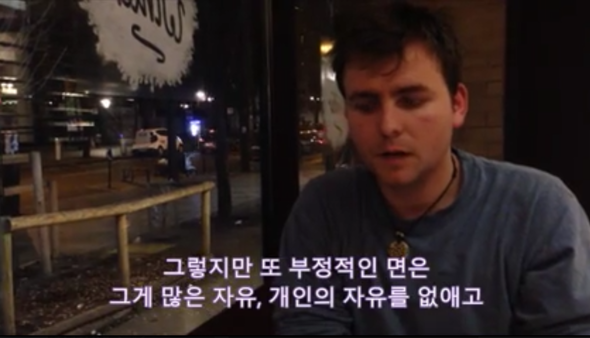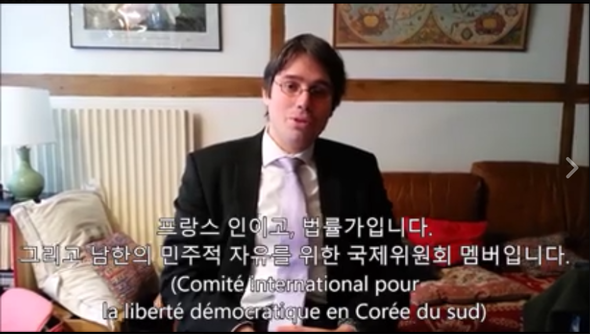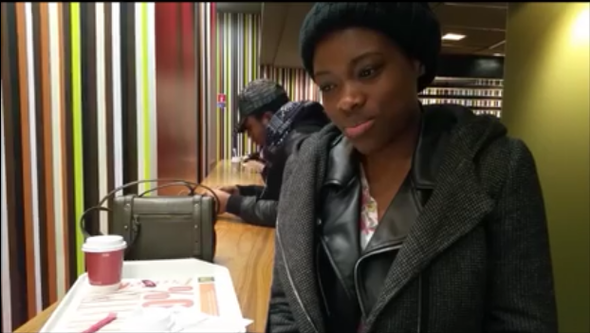hankyoreh
Links to other country sites 다른 나라 사이트 링크
S. Korean anti-terror law - the view from Paris

Andrei, a Romanian immigrant living in Paris, seemed perplexed when asked for his thoughts on South Korea’s introduction of the Anti-Terror Act.
“France has had terrorist attacks - nothing has happened in South Korea,” he said. “I’m not sure why they want that.”
Andrei, who works at a supermarket, didn’t have much trouble imagining what would happen off on the other side of the globe in South Korea once the anti-terror law is introduced.
“Any time there’s a protest there, the government is going to give more power to police and try to manage demonstrations,” he said. “Like in France, the police aren‘t going to need warrants anymore when they arrest or inspect people.”

A current project is under way in France to ask locals for their thoughts on South Korea’s anti-terror bill. The country is currently under a state of emergency after a series of terrorist attacks in Paris in Nov. 2015.
Lee Ye-da, a South Korean who has lived in France since 2012 after applying for refugee status over his conscientious objection to mandatory military service, joined exchange students Park Mi-ri and Ahn In-seon on Feb. 23 in capturing a video record of French citizens who live under an actual state of emergency sharing their thoughts on South Korea‘s anti-terror legislation. The interviews are available for view on a Facebook page titled “We Asked” (www.facebook.com/questionnerparis).

The project began when Ahn had the idea of examining the contradictions in the South Korean law from the standpoint of France’s situation. The organizers felt that the Paris attacks ignited the anti-terror law debate in South Korea and that France’s current state represents South Korea’s possible near future once the law goes into effect.
France‘s state of emergency is set to continue until May 26. During that time, investigative authorities will be able to search homes without a court-issued warrant and place people under house arrest in cases of suspected terrorist involvement.
One of the “We Asked” interviewees, a jurist named Benoit, feared that the South Korean anti-terror law would “end up like the National Security Law and be used against all people who oppose the administration.”
As a member of the International Committee for Democratic Freedom in South Korea, Benoit closely follows the situation in South Korea. Speaking in an interview on Feb. 24 after observing a filibuster attempt against the law by Minjoo Party of Korea lawmaker Eun Soo-mi, he observed, “In France, they received the opposition’s consent when they declared a state of emergency, but in South Korea there was no agreement.”
The organizers are also planning to stage a “state of emergency opposition conference” at Park’s school, the University of Paris 8, on Mar. 10 to share the interview footage and inform locals about the South Korean situation.
“In Paris, there were actual terrorist attacks, yet even there many people asking, ‘Why should we extend the state of emergency? Who benefits?’” Park noted.
“South Korea should be taking a lesson from France.”
By Ko Han-sol, staff reporter
Please direct questions or comments to [english@hani.co.kr]

Editorial・opinion
![[Column] Season 2 of special prosecutor probe may be coming to Korea soon [Column] Season 2 of special prosecutor probe may be coming to Korea soon](https://flexible.img.hani.co.kr/flexible/normal/500/300/imgdb/original/2024/0426/3317141030699447.jpg) [Column] Season 2 of special prosecutor probe may be coming to Korea soon
[Column] Season 2 of special prosecutor probe may be coming to Korea soon![[Column] Park Geun-hye déjà vu in Yoon Suk-yeol [Column] Park Geun-hye déjà vu in Yoon Suk-yeol](https://flexible.img.hani.co.kr/flexible/normal/500/300/imgdb/original/2024/0424/651713945113788.jpg) [Column] Park Geun-hye déjà vu in Yoon Suk-yeol
[Column] Park Geun-hye déjà vu in Yoon Suk-yeol- [Editorial] New weight of N. Korea’s nuclear threats makes dialogue all the more urgent
- [Guest essay] The real reason Korea’s new right wants to dub Rhee a founding father
- [Column] ‘Choson’: Is it time we start referring to N. Korea in its own terms?
- [Editorial] Japan’s rewriting of history with Korea has gone too far
- [Column] The president’s questionable capacity for dialogue
- [Column] Are chaebol firms just pizza pies for families to divvy up as they please?
- [Column] Has Korea, too, crossed the Rubicon on China?
- [Correspondent’s column] In Japan’s alliance with US, echoes of its past alliances with UK
Most viewed articles
- 1‘We must say no’: Seoul defense chief on Korean, USFK involvement in hypothetical Taiwan crisis
- 2N. Korean delegation’s trip to Iran shows how Pyongyang is leveraging ties with Moscow
- 3‘Weddingflation’ breaks the bank for Korean couples-to-be
- 4Korea sees more deaths than births for 52nd consecutive month in February
- 5[Editorial] New weight of N. Korea’s nuclear threats makes dialogue all the more urgent
- 6[Column] Park Geun-hye déjà vu in Yoon Suk-yeol
- 7[Column] Has Korea, too, crossed the Rubicon on China?
- 8[Guest essay] The real reason Korea’s new right wants to dub Rhee a founding father
- 9Will NewJeans end up collateral damage in internal feud at K-pop juggernaut Hybe?
- 10Why Korea shouldn’t welcome Japan’s newly beefed up defense cooperation with US